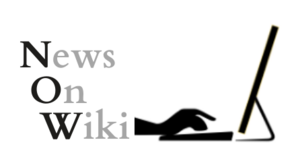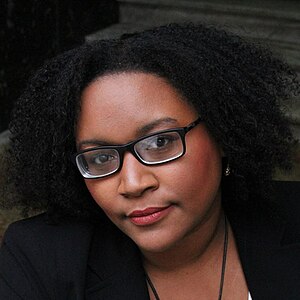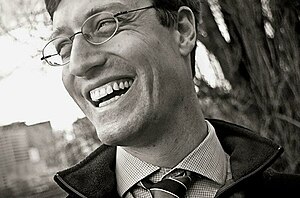Difference between revisions of "2019/Grants/News on Wiki, Phase Two (b)"
Peteforsyth (talk | contribs) m (title) |
Peteforsyth (talk | contribs) (soft redirect to 2019/Grants/News on Wiki, Phase Two) |
||
| (4 intermediate revisions by one other user not shown) | |||
| Line 1: | Line 1: | ||
| + | This grant proposal has been withdrawn by the proposers, in place of the unified grant proposal: |
||
| + | |||
| + | * '''[[2019/Grants/News on Wiki, Phase Two]]''' |
||
| + | |||
| + | {{collapse top|Original Phase Two (b) proposal}} |
||
{{WCNA 2019 Grant Submission |
{{WCNA 2019 Grant Submission |
||
|name=Sherry Antoine and Pete Forsyth |
|name=Sherry Antoine and Pete Forsyth |
||
| Line 8: | Line 13: | ||
|type=Research + Output |
|type=Research + Output |
||
|idea={{clear}} |
|idea={{clear}} |
||
| + | |||
| − | [[File: |
+ | [[File:News on Wiki NOW Logo.png|thumb|News on Wiki NOW Logo]] |
[[File:U.S. newspapers with Wikidata entries.png|thumb|This map, generated by a Wikidata query built during Phase One, reflects wiki coverage of U.S. newspapers as of September 2018. {{legend|red|Wikidata item, no Wikipedia article}}{{legend|yellow|Wikipedia has no infobox}}{{legend|green|Wikipedia article has an infobox}}]] |
[[File:U.S. newspapers with Wikidata entries.png|thumb|This map, generated by a Wikidata query built during Phase One, reflects wiki coverage of U.S. newspapers as of September 2018. {{legend|red|Wikidata item, no Wikipedia article}}{{legend|yellow|Wikipedia has no infobox}}{{legend|green|Wikipedia article has an infobox}}]] |
||
| Line 77: | Line 83: | ||
|people= |
|people= |
||
| − | [[File: |
+ | [[File:Sherry Antoine, NYC.jpg|thumb|Sherry Antoine]] |
'''Sherry Antoine, MPA''' is a New York-based outreach consultant and speaker committed to addressing gender and diversity gaps. She is the Lead Organizer of the [https://meta.wikimedia.org/wiki/Wikimedians_of_the_Caribbean_User_Group Wikimedians of the Caribbean Wikimedia User Group], a group dedicated to improving and adding content about the Caribbean and its diaspora to Wikipedia, Wikidata and related projects. Sherry is the executive director of [https://en.wikipedia.org/wiki/Wikipedia:Meetup/NYC/AfroCrowd/Home AfroCROWD], an outreach initiative and Wikimedia user group which seeks to increase awareness among people of African descent of Wikimedia and the free knowledge, culture, and software movements . Sherry is a director on the board of the [http://isoc-ny.org/ Internet Society of New York], whose mission is to assure the beneficial and open evolution of the global Internet. |
'''Sherry Antoine, MPA''' is a New York-based outreach consultant and speaker committed to addressing gender and diversity gaps. She is the Lead Organizer of the [https://meta.wikimedia.org/wiki/Wikimedians_of_the_Caribbean_User_Group Wikimedians of the Caribbean Wikimedia User Group], a group dedicated to improving and adding content about the Caribbean and its diaspora to Wikipedia, Wikidata and related projects. Sherry is the executive director of [https://en.wikipedia.org/wiki/Wikipedia:Meetup/NYC/AfroCrowd/Home AfroCROWD], an outreach initiative and Wikimedia user group which seeks to increase awareness among people of African descent of Wikimedia and the free knowledge, culture, and software movements . Sherry is a director on the board of the [http://isoc-ny.org/ Internet Society of New York], whose mission is to assure the beneficial and open evolution of the global Internet. |
||
| Line 118: | Line 124: | ||
Through his consulting agency Wiki Strategies, Pete Forsyth won and fulfilled a [https://hewlett.org/grants/university-of-mississippi-for-the-open-education-collaborative-documentation-project/ $140,000 grant from the William and Flora Hewlett Foundation], the primary output of which was the six-week online course Writing Wikipedia Articles. He won and fulfilled a [https://blog.wikimedia.org/2012/02/16/glamcamp-dc-kicks-off-us-coordination-glam-wiki/ $10,000 grant from the Wikimedia Foundation] in 2012, which convened Wikimedians and museum professionals to develop programming, documentation, and outreach infrastructure at the intersection of museum volunteerism and Wikipedia. The initial phase of the NOW campaign was funded by a grant from Paul and Susan Haahr, which provided a charitable incentive for the creation or improvement of Wikipedia content about newspapers. |
Through his consulting agency Wiki Strategies, Pete Forsyth won and fulfilled a [https://hewlett.org/grants/university-of-mississippi-for-the-open-education-collaborative-documentation-project/ $140,000 grant from the William and Flora Hewlett Foundation], the primary output of which was the six-week online course Writing Wikipedia Articles. He won and fulfilled a [https://blog.wikimedia.org/2012/02/16/glamcamp-dc-kicks-off-us-coordination-glam-wiki/ $10,000 grant from the Wikimedia Foundation] in 2012, which convened Wikimedians and museum professionals to develop programming, documentation, and outreach infrastructure at the intersection of museum volunteerism and Wikipedia. The initial phase of the NOW campaign was funded by a grant from Paul and Susan Haahr, which provided a charitable incentive for the creation or improvement of Wikipedia content about newspapers. |
||
}} |
}} |
||
| + | <references /> |
||
| + | {{collapse bottom}} |
||
Latest revision as of 20:56, 3 July 2020
This grant proposal has been withdrawn by the proposers, in place of the unified grant proposal:
Original Phase Two (b) proposal
|
|---|
|
News on Wiki, Phase Two (b) Name: Sherry Antoine and Pete Forsyth Wikimedia username: E-mail address: Resume: Geographical impact: North America Type of project: Research + Output What is your idea? The News On Wiki (NOW) campaign, Phase Two, aims to improve the public’s access to information about credible news publishers. In Phase One of this campaign (2018), we demonstrated that by improving wiki content, we could improve Google Knowledge Panels and other search engine results pages (SERPs) for local news sources. We rallied both new and veteran Wikimedians to build wiki content. We reported on this process at the WikiCite (2018) and WikiConference North America (2019) conferences. For a second phase, we propose to run two campaigns in parallel: (a) A campaign to expand Wikipedia and Wikidata content for newspapers west of the Rocky Mountains (see: News on Wiki, Phase Two (a)), and (b) the campaign, described below, to expand Wikipedia's coverage of minority-owned newspapers and Caribbean-focused newspapers. We will build on the success of Phase One, and generate a clear roadmap to an expanded version of this campaign. A recent New York Times article[1] made two points that underscore the need and the opportunity associated with the NOW campaign: "The pandemic is one of the biggest stories most publications will ever cover. But it has left many of them struggling to stay solvent." The public is increasingly reliant on news outlets for information that impacts their health and economic well-being. In a media environment rife with misinformation, the ability to form quick, accurate assessments about what outlets are reliable is more important than ever. The impacts to the news industry itself yield a resource that is invaluable to a campaign like ours: major press coverage of local news outlets. The news story cited above, in one of the country's most renowned newspapers, is a Wikipedia-ready reliable source with information about more than a dozen local news outlets in North America. The Riverfront Times, a St. Louis newspaper featured as the hook for the Times story, has only eight independent, news-based footnotes in its Wikipedia entry as of this writing, and the narrative in its four short paragraphs ends in mid-2019. The Times story makes it an easy task to make a substantive addition to the Wikipedia article that will help St. Louis residents better understand their news landscape. Recent, high quality coverage of the struggles of individual local news outlets means that many such Wikipedia articles can be easily expanded. Why is it important? In our era of information overload, the general public often can struggle to make accurate judgments about the basic credibility of news sources. Bad actors have leveraged this situation to serve political ends; in the most egregious cases, a malevolent webmaster "spoof" an established, trusted newspaper (e.g. the "Denver Guardian" or the "Baltimore Gazette"), for the sole purpose of spreading a single false story.
In published research, including "How the Interplay of Google and Wikipedia Affects Perceptions of Online News Sources" (Computation and Journalism Symposium 2019), Wellesley scholars Rothschild, Lurie, and Mustafaraj have demonstrated that Wikipedia content plays a significant role in determining web search results, and specifically in determining whether or not a Knowledge Panel is displayed. Because individuals often search the web to quickly evaluate the quality of an unfamiliar news source, Wikipedia content can strongly influence the reputation of news sources. As Wikimedia Foundation research scientist Isaac Johnson noted in a Signpost review, the paper "highlights the incredible value that Wikipedia provides ... for helping readers assess the credibility of news sources," and it discusses Phase One of NOW. Furthermore, Wikidata increasingly plays a role in search engine results. This vetted connection between wiki content and public media literacy presents an extraordinary opportunity: Wikipedians and news literacy advocates can directly improve the public's ability to distinguish good from bad sources by editing Wikipedia and Wikidata. Our News on Wiki campaign, appropriately abbreviated "NOW," facilitates and encourages this activity, thereby benefiting the public; and in the process, we build information literacy and facilitate social networking among our participants and followers, which ensures that our impact is ongoing. The time for NOW, we like to say, is now. Is your project already in progress? Yes. Phase One, completed in 2018 and reported at WikiConference North America in 2019, demonstrated the idea's potential, generated many new and improved articles, built awareness and support among key stakeholders, and documented effective interventions. That effort has proven self-sustaining, up to a point: volunteers have continued the work we began. With a funded Phase Two, we can maximize the potential of the efforts underway, the lessons we have already learned, and the resources we have already created. We aim to take another strong step toward documenting all notable news outlets on Wikipedia and Wikidata. How is it relevant to credibility and Wikipedia? (max 500 words) This campaign will:
What is the ultimate impact of this project? This campaign's output helps the general public distinguish "real" from "fake" news sources, and learn more about the real ones. It also helps news organizations and other professionals grasp the significance of Wikipedia as a repository of information relating to credibility, and learn how to engage ethically and effectively with the Wikimedia projects. This campaign will benefit a diverse population, due to the extent to which existing news media, Internet search services, and Wikipedia inform a diverse population. Specialized press oriented toward specific social and racial groups are included, but they are not a central emphasis; the need of a diverse public to access accurate information from its mainstream local news outlets is our primary concern. This high level effort to highlight credible news sources improves the public's access to good information about all topics covered in the news, including climate science, health, policy, and politics.  Including qualitative goals, in addition to the kind of quantitative goals which drove Phase One, will permit more creative, topic-specific activities. For instance, this chart, from Penn's 1891 book The Afro-American Press and Its Editors, reflects a steep rise in black-owned newspapers during the 1880s. A more modern presentation of this data, like that below, could be added to the Wikipedia article on African-American newspapers.
Could it scale? Yes, scaling is one of the primary benefits of our iterative and community-building approach. We have designed our outreach techniques to engage and connect volunteers with a wide variety of relevant expertise, which result in lasting, productive relationships and peer support. The learning and coordination resources we produce are published under a free license, and endure on wiki pages and other freely accessible Internet pages. Most importantly, we openly document and refine our model with each iteration, which permits us or others to apply it to other regions, countries, or even other wiki topic areas. Specifically, the campaign could be scaled on any of the following vectors:
We estimate that 1,000 to 2,000 local U.S. newspapers meet English Wikipedia's inclusion criteria, but lack an article. Other language editions cover even fewer U.S. newspapers. Why are you the people to do it? Sherry Antoine, MPA is a New York-based outreach consultant and speaker committed to addressing gender and diversity gaps. She is the Lead Organizer of the Wikimedians of the Caribbean Wikimedia User Group, a group dedicated to improving and adding content about the Caribbean and its diaspora to Wikipedia, Wikidata and related projects. Sherry is the executive director of AfroCROWD, an outreach initiative and Wikimedia user group which seeks to increase awareness among people of African descent of Wikimedia and the free knowledge, culture, and software movements . Sherry is a director on the board of the Internet Society of New York, whose mission is to assure the beneficial and open evolution of the global Internet. Pete Forsyth was a leader in the NOW campaign, Phase One (2018). He has run the Wikipedia training and consulting agency Wiki Strategies since 2009. In that capacity and in his role as the Wikimedia Foundation's first Public Outreach Officer, he has guided major foundations, NGOs, universities, and corporations in effective, ethical engagement with Wikipedia. Notably, he was an early architect of the Wikimedia Foundation's strategy around higher education, and he designed the six-week online course "Writing Wikipedia Articles," which he taught four times. Universities and conferences worldwide have engaged him to present on Wikipedia, and he has convened and moderated several panel discussions focused on Wikipedia and the news, featuring both news experts and Wikipedia experts. In addition, we are keeping the other leaders of Phase One in the loop. These include internationally renowned and published experts in media literacy and education, digital learning, data science, and wiki technology and community. Not all Phase One campaign leaders will have the capacity for full engagement in Phase Two, but all remain valuable allies, promoters, and advisers, and we hope to engage them in a future phase. What is the impact of your idea on diversity and inclusiveness of the Wikimedia movement? The primary objective of this project is to generally improve the public's access to information about news credibility, which benefits Internet users regardless of their demographics. We are highly inclusive, both in our outreach, and in our willingness to follow our participants' passions and specific interests within the broad framework of our campaign. There are three ways we further address diversity within this broad objective:
What are the challenges associated with this project and how you will overcome them?
Overall, the structure of NOW mitigates the first and second challenges listed above. Because we measure success in the creation of wiki content, rather than the activity of participants, any success we have in engaging veterans can mitigate difficulty in engaging newcomers, and vice-versa. In practice, Phase One taught us that there can be strong symbiosis in engaging newcomers and veterans simultaneously, as it generates numerous opportunities for peer-to-peer leadership and learning. How much money are you requesting? USD $10,000 How will you spend the money? $9,500 compensation for the time of Sherry Antoine and Pete Forsyth to plan and conduct the project. $500 for tools or services (e.g., web conference software). Phase Two will employ a different model than Phase One. In Phase One, the only explicit expenditure was for an incentive ($25 donations to charity) for each Wikipedia article created or improved. All project leadership costs were "hidden," in the sense that the conveners' time was compensated as part of their ordinary employment. Phase Two will shift the focus from in-person edit-a-thons to online training, a model Forsyth employed for the Writing Wikipedia Articles course mentioned above. This is partly in response to the social distancing required by the COVID-19 pandemic, and partly in order to explore a model that will be more easily scalable and sustainable for future efforts. How long will your project take? We are ready to commence immediately (and in some respects, work is already underway). We anticipate completion, including detailed reporting, by January 15, 2021. The primary effort will focus on a six-month campaign (June 15, 2020 – December 15, 2021). Have you worked on projects for previous grants before? Yes. Through her organizational and outreach consulting work for AfroCROWD, Sherry Antoine has helped garner and implement annual grants from the Wikimedia Foundation totaling more than $200,000 for strategic planning, operation, reporting, partnership development, management, and outreach for the initiative. She was key in helping to grow the project from a meetup in the New York area to a Wikimedia User Group with a solid following online and partners and events worldwide and was recently asked to lead the initiative as its executive director. Sherry is also a founding member of the Wikimedians of the Caribbean User group and is currently its lead organizer. She helped form a working group. In less than a year, this resulted in the group winning an award and presenting at the preeminent multinational regional conference of Wikipedians in North America, WikiConference North America. The group remains active and may be good partners for the work of NOW in recognizing Caribbean periodicals. Wiki Caribbean has already worked on events with partners like Microsoft Caribbean, the ACURIL researcher conference, and the University of the West Indies. Through his consulting agency Wiki Strategies, Pete Forsyth won and fulfilled a $140,000 grant from the William and Flora Hewlett Foundation, the primary output of which was the six-week online course Writing Wikipedia Articles. He won and fulfilled a $10,000 grant from the Wikimedia Foundation in 2012, which convened Wikimedians and museum professionals to develop programming, documentation, and outreach infrastructure at the intersection of museum volunteerism and Wikipedia. The initial phase of the NOW campaign was funded by a grant from Paul and Susan Haahr, which provided a charitable incentive for the creation or improvement of Wikipedia content about newspapers.
|






